Team Experience is celebrating pets at the movies (and in our homes) for a couple more days. Here's Cláudio Alves...
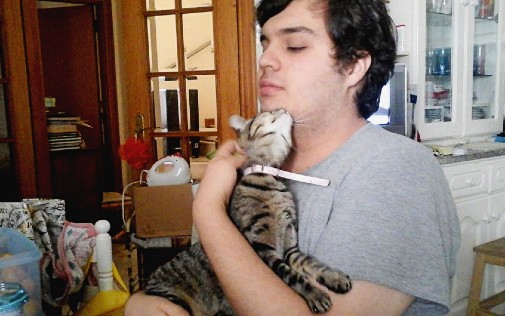 Me and Maggie
Me and Maggie
In my family, the history of our pets tends to be linked to a sense of loss. Through my early childhood, we had two dogs, a beautiful Cocker Spaniel called Gigi and an English Setter by the name of Minnie. Gigi had been my mother's dog and she, unfortunately, died while I was still very young, but Minnie was born the same year as me and we grew up together. That is until she got sick when I was nine, cancer quickly making the lively companion become lethargic and in constant pain. She was put down before the suffering continued and I was heartbroken. Seeing that, my mom, who had a lifelong distrust for cats due to some unfortunate experiences as a child, put her bad feelings aside and decided to adopt an adorable little kitten I had grown fond of in the weeks before Minnie's passing…
 Joana was a beautiful black kitten who had been born to one of my classmate's cats. The rest of her siblings had been quickly adopted, but, perhaps due to her coloring and some ugly superstitions, she had been left behind. I had no problem loving a cat since I'd spent years looking at them in movies and adoring them from the distance. Spending time with my friend's pets helped, too. As for my mom, she quickly changed her mind about having felines as pets. Joana adored her and the feeling was mutual, though the proud cat never extended that reverence to any other person. I still have a faint scar on my hand from when I tried to pet her while she wasn't in the mood. Still, we all adored her and became devoted cat people henceforth.
Joana was a beautiful black kitten who had been born to one of my classmate's cats. The rest of her siblings had been quickly adopted, but, perhaps due to her coloring and some ugly superstitions, she had been left behind. I had no problem loving a cat since I'd spent years looking at them in movies and adoring them from the distance. Spending time with my friend's pets helped, too. As for my mom, she quickly changed her mind about having felines as pets. Joana adored her and the feeling was mutual, though the proud cat never extended that reverence to any other person. I still have a faint scar on my hand from when I tried to pet her while she wasn't in the mood. Still, we all adored her and became devoted cat people henceforth.
The year I was starting college, my mom, who's a high school History teacher, had a student who had two kittens that she couldn't keep in her apartment. Once more, we opened our house to these felines in need of a home and that's how Maggie the Cat and Liza came to live with us. Unlike Joana, who had quickly become my mother's cat, these two young'uns became close to me and my sister instead. We dote on them so much, that my parents took to calling them their furry tiny grandkids. Anyway, remember what I said about loss? Well, almost at the same time as these newcomer's arrival, Joana's health started to deteriorate.
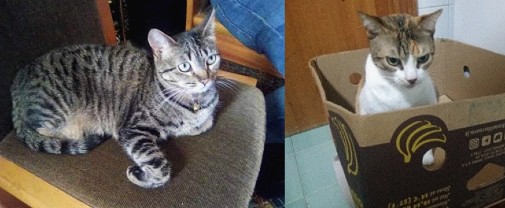 Maggie and Liza
Maggie and Liza
I will spare you the graphic details but, by Valentine's Day 2014, Joana was gone, her passing always tinging with melancholy our memories of Maggie and Liza's first years with us. Still, everyone's lives go on, even though it's sometimes painful to overcome the demons in our heads. Maggie has been a great help when it comes to my struggle with such mental troubles since she always seems to know when I'm feeling down. For years, I tried to hide what I've come to discover were symptoms of depression and I got good at performing happiness when inside I was feeling anything but. Friends and family have told me they never knew until, last year, I finally opened up and asked for help. Maggie, though, was always there, ready to spell away the darkness with her affectionate purrs and endearing neediness.
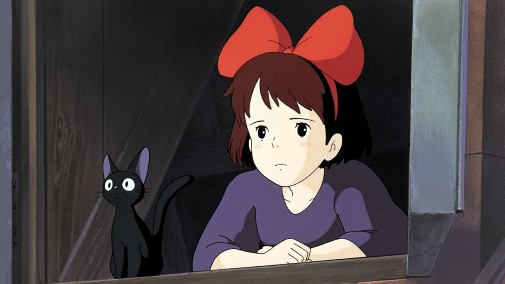
I apologize for indulging in personal storytelling a tad too much. However, I wanted you to have some context when I tell about my overwhelming affection for the black kitten in Kiki's Delivery Service, a movie I've watched countless times since childhood.
Hayao Miyazaki's fifth feature is based upon a novel by Eiko Kadono and tells the story of thirteen-year-old Kiki. She's a witch and, according to the traditions of her people, she must now go into the world and forge a path independent from her parents. For this journey, Kiki only takes three tokens of her past life, her mother's broom, her father's radio, and Jiji, the adorable black cat familiar to which the young girl can talk to. In no time, she has settled in a seaside town and started her own business, a delivery service that puts to use her flying abilities.
All in all, it's a rather simple coming of age story, beautiful to look at, funny and often cute beyond words. Jiji, in particular, is one of Studio Ghibli's most appealing creations, wonderfully expressive but still cat-like enough to feel real. With the disposition of a slightly sardonic boy and the dependability of a loyal pet, he's often the only ray of sunshine in Kiki's stormy life. You see, despite its delightful nature, Kiki's Delivery Service has a darker side. Unlike many a creator of children's media, Miyazaki never talks down to his audience, showing great respect and admiration for the perspective of children. With that respect comes the acknowledgment of the particular pains of a growing child. Specifically, the pain of maturing into adulthood.
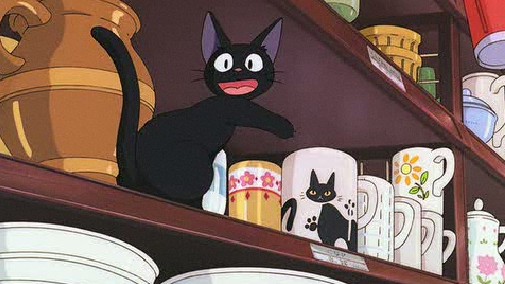
Kiki's business endeavors aren't any sort of instantaneous triumph and, despite the bright colors and cheery music, this is a tale defined by a string of disappointments constantly weighing down our heroine. Exhausted and unfulfilled, alone in a big town far away from everything familiar, she's often consumed by despondence. At the start, Jiji is always there to make her smile and he even helps her out during an adventurous delivery that gets sidetracked by a bird strike. However, as Kiki falls into increasing emotional distress, even he starts to drift away. At a certain point, the witch stops being able to understand his speech and the impact of that is brutal, both for Kiki and the audience.
For so long, Jiji is Kiki's only company, the only individual that can cheer her up when things are down, that is absence creates a void that threatens to swallow the entire film. Still, like everything in life, we must move on and keep on living. Loss hurts, depression drowns, but we and Kiki have to move forward. Some extraordinary circumstances give the film a cheery ending, a new hope making life more bearable and Jiji even returns to Kiki's side, though we never again hear him speak. Like many things in childhood, the witch's reliance on her companion is a thing she has to grow out of. He's still there, ready to cuddle at all times, but the loss of communication stings and it's one of the things that forces Kiki to open herself up to others. Like all of us, Kiki must grow up.
It's heartbreaking, but so is life. It's cuteness holding hands with loss, happiness born out of despair, a black kitty that makes me joyful and melancholic in equal measure.
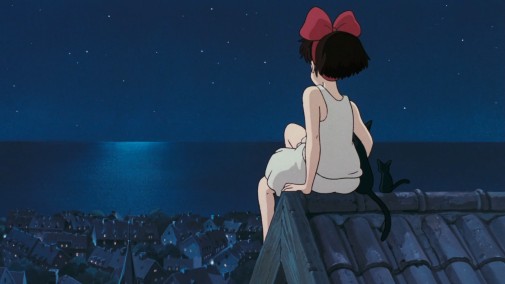
previously: